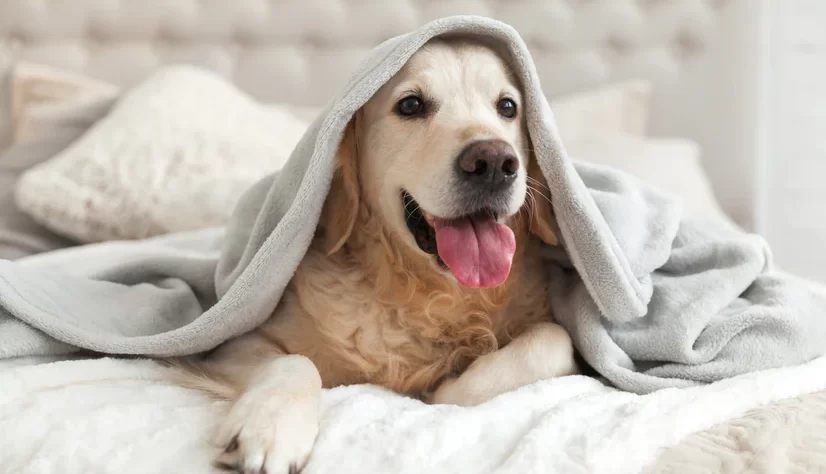
Does Your Dog Help You Sleep?
(In collaboration with Simba)
Does your dog help you sleep? Is it a sleep saviour or a snooze saboteur? With one in four households now owning a dog yours may keep you company at night. Does your dog help you sleep or disturb you?
Good Sleep Partners
Known as our four-legged best friends do our beloved dogs really make the best sleep partners? The debates are ongoing when it comes to sharing your bed with your dog. A recent study revealed almost half of UK dog owners (48%) share their bed with their dog! bed. Does this however make for a better or worse night’s sleep?
Does Your Dog Help You Sleep?
Sleep tech firm Simba, together with animal behaviourist Professor Peter Neville, has been researching this topic. Investigating the pros and cons of sharing your bed with your pooch.
Simbas study was based on the UK’s top 20 most popular breeds. It analysed the sleeping habits of over 1,000 UK owners. The study was looking to understand which breed is the best and worst bed partner. They also studied other dogs sleeping quirks. Snoring, wriggling, and passing wind! All of which could be impacting your precious sleep.
Top of the Dogs.
Top of the sleep-inducing pooches was Labrador Retrievers, a family favourite. Despite them being hairballs and hogging the bed, owners were less likely to have insomnia, sleep apnoea, or snoring. In addition, the research showed that Labradors don’t move a muscle throughout the night. Owners of them were reported to get more sleep than those of other breeds. On average a good 6 hours. Labrador Retrievers are by far the most popular breed with dog owners. They learn quickly how to appeal to their humans, understanding that stillness is key. They know not to stir or make any noise unless it’s to defend the home.
Second for Slumber, Dashhunds
Consistently ranked as one of the most popular breeds based on their playfulness and their natural instinct to stay close. People also love their portable size. They do make great bed companions and act as lovely hot water bottles. However, it’s in their genes to burrow into dark places and they are fearless in the dark. You may just find your little Stanley trying to hog your whole bed! Don’t think of turning off the heating either, this will only make them worse. Your covers will definitely become their covers.
Twitchy Bed Companions
Does your dog help you sleep? For Hungarian Vizslas owners, the answer is no. Affectionately known as velcro dogs, they need company during the day and become restless in the evenings. Understandably, these dogs don’t make for the best sleep companions. Owners report that they only clocked an average of 5 hours of sleep a night due to their pet’s restlessness. Being fit, active hunting dogs they still have energy at night.
Bad Breath!
Similarly, German Pointers don’t make good sleep buddies. Simbas research found owners were likely to lose sleep due to being too hot at night. German Pointers, unlike Labradors, don’t lay still. Did you know dogs only have sweat glands in their noses and foot pads? As a larger, muscly breed, Pointers rely on panting & shifting positions to cool themselves down. They also tend to have bad breath due to diet and dental hygiene. Yuck!
Wind!
Whippets tend to be windy bed pals and are most active at night. Along with Staffordshire Bull Terriers and French Bulldogs who also have bad breath, it’s worth thinking about which dog to choose or whether you let them share your bed! If you’re prone to snoring, rest assured any flat-nosed breed will join you! They also snort!
6 Dos and Don’t of sharing your bed with your dog
1) DO keep the room cool
A temperature-savvy duvet, such as Simba’s Hybrid 3-in-1 duvet, designed with cooling Stratos® technology, works as two duvets for Spring/Autumn (7 Tog) and Summer (3.5 Tog)
The Simba Hybrid® Pro Mattress is designed with up to 4,000 Aerocoil® springs nestled in the uppermost layers for superior comfort, while a British wool layer ensures better temperature regulation.
2) DO your best to tire your pooch out before bedtime with exercise and play
3) DON’T feed them or give them too much water before hitting the hay
4) DO keep your canine comfortable and calm
5) DO regularly wash and change your bed sheets
For the best night’s sleep, Simba’s Performance Bed Linen is made from 100% cotton, a naturally breathable fabric that feels soft and smooth for humans and canines alike. Not to mention the linen has a Simba Stratos finish to help dissipate excess body heat.
6) DO get the biggest bed you can!
A collaborative post is one where I have been paid or gifted an item for hosting the content on CaronCares. This blog does not make me an income and these donations are welcome! I was given a pillow and I can genuinely recommend them for supreme comfort and improved sleep.

